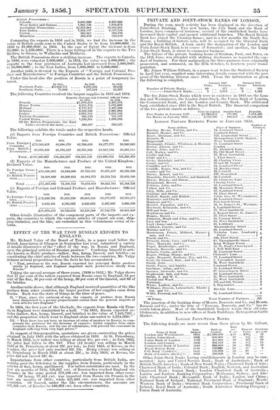EFFECT OF THE WAR UPON RUSSIAN EXPORTS TO ENGLAND. Mr.
Richard Valpy of the Board of Trade, in a paper read before the British Association at Glasgow in September last yearubmitted a variety of details illustrative of the " effect of the war, in Russia and England, '
upon the principal articles of Russian produce R ce." Confining himself to Arti- cles known as Baltic produce—tallow, flax, hemp, linseed, and bristles—as' constituting the chief articles of trade between the two countries, Mr. Valpy deduces several propositions from the facts he has accumulated.
I. " That, previous to the war, Russia exported her principal Baltic produce chiefly to England, and England imported such productions chiefly from Russia."
Taking the annual average of three years, (1850 to 1852,) Mr. Valpy shows that 77 per cent of the tallow• exported from Russia came to England, 64 per cent of the flax, 56 per cent of the hemp, 60 per cent of the linseed, and 63 of the bristles.
Another table shows, that although England received quantities of the like produce from other countries, the larger portion of her supplies came from Russia. Such was the state of things an the time of peace.
II. " That, since the outbreak of war, the exports of produce from Russia have diminished to a greater proportionate extent than the general imports of such articles into England."
In 1864, the first year of the blockade the exports from Russia via Prus- sia to England were diminished by a half. " In 1863, Russia exported ar-. ticks (tallow, flax, hemp, linseed, and bristles) to the value of 7,445,789/. ; and the proportion which went to England alone amounted to 5,624,6660
III. " That there has not been an increase of value of produce in Russia, to com- pensate the producer for the decrease of exports; • whilst supplies from other countries than Russia, and the use of substitutes, will prevent the consumer in England suffering from very high prices."
In support of this proposition, quotations are given contrasting the prices obtained in July 185.5 with the prices obtained in 1853. At St. Petersburg, in March 1853, new tallow was selling at about 418. per cwt. • in July 1855, the price had fallen to 328. 10d. Flax (12 heads) was selling in March 1853 at St. Petersburg at about 291. per ton; in July 1855, at Kovno, on the frontier, the price had only reached 331. 15s. Hemp (clean) was selling at St. Petersburg in March 1853 at about 29/. ; in July 1855, at Kovno, the Price did not exceed 32/. 58.
Importations from other countries, particularly from British India, are making good the deficiency. in the supplies from Russia, particularly in the' articles of flax, hemp, and linseed. For tallow substitutes are used. In the. first six months of 18.5.5, 128,627 cwt. of Russian flax reached England via Prussia in the same period 179,108 cwt. was imported from other coun-' tries. Of hemp, 97,441 cwt. was imported from Russia via Prussia in the first six months of 18.55; while 521,843 cwt. was imported from other countries. Of linseed, under the like circumstances the amounts are 101,101 cwt. of Russian to 349,892 cwt. from other countries.










































 Previous page
Previous page